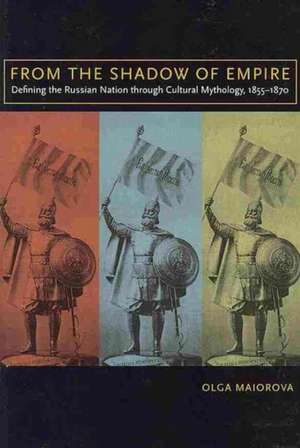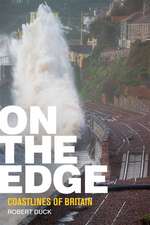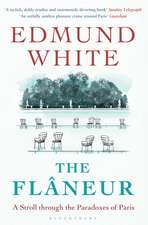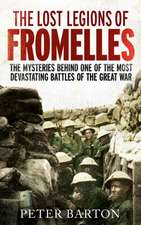From the Shadow of Empire: Defining the Russian Nation through Cultural Mythology, 1855–1870
Autor Olga Maiorovaen Limba Engleză Paperback – 17 aug 2010
As nationalism spread across nineteenth-century Europe, Russia’s national identity remained murky: there was no clear distinction between the Russian nation and the expanding multiethnic empire that called itself “Russian.” When Tsar Alexander II’s Great Reforms (1855–1870s) allowed some freedom for public debate, Russian nationalist intellectuals embarked on a major project—which they undertook in daily press, popular historiography, and works of fiction—of finding the Russian nation within the empire and rendering the empire in nationalistic terms.
From the Shadow of Empire traces how these nationalist writers refashioned key historical myths—the legend of the nation’s spiritual birth, the tale of the founding of Russia, stories of Cossack independence—to portray the Russian people as the ruling nationality, whose character would define the empire. In an effort to press the government to alter its traditional imperial policies, writers from across the political spectrum made the cult of military victories into the dominant form of national myth-making: in the absence of popular political participation, wars allowed for the people’s involvement in public affairs and conjured an image of unity between ruler and nation. With their increasing reliance on the war metaphor, Reform-era thinkers prepared the ground for the brutal Russification policies of the late nineteenth century and contributed to the aggressive character of twentieth-century Russian nationalism.
From the Shadow of Empire traces how these nationalist writers refashioned key historical myths—the legend of the nation’s spiritual birth, the tale of the founding of Russia, stories of Cossack independence—to portray the Russian people as the ruling nationality, whose character would define the empire. In an effort to press the government to alter its traditional imperial policies, writers from across the political spectrum made the cult of military victories into the dominant form of national myth-making: in the absence of popular political participation, wars allowed for the people’s involvement in public affairs and conjured an image of unity between ruler and nation. With their increasing reliance on the war metaphor, Reform-era thinkers prepared the ground for the brutal Russification policies of the late nineteenth century and contributed to the aggressive character of twentieth-century Russian nationalism.
Preț: 237.93 lei
Nou
Puncte Express: 357
Preț estimativ în valută:
45.53€ • 47.54$ • 37.59£
45.53€ • 47.54$ • 37.59£
Carte tipărită la comandă
Livrare economică 15-29 aprilie
Preluare comenzi: 021 569.72.76
Specificații
ISBN-13: 9780299235949
ISBN-10: 0299235947
Pagini: 294
Ilustrații: 10 b-w illus.
Dimensiuni: 152 x 229 x 20 mm
Greutate: 0.4 kg
Ediția:1
Editura: University of Wisconsin Press
Colecția University of Wisconsin Press
ISBN-10: 0299235947
Pagini: 294
Ilustrații: 10 b-w illus.
Dimensiuni: 152 x 229 x 20 mm
Greutate: 0.4 kg
Ediția:1
Editura: University of Wisconsin Press
Colecția University of Wisconsin Press
Recenzii
“Spanning a wide spectrum of competing visions of what it means to be ‘Russian,’ From the Shadow of Empire represents nationalist ideology as a dynamic interrelation of concurrent positions, intense struggles, and temporary alliances shifting over time.”—Irina Paperno, University of California, Berkeley
“Maiorova’s pathbreaking cultural history of the construction of Russian national identity in the decades after the Crimean War is built on deep analysis of the literature and historiography of the period. It is essential reading for anyone seriously interested in nineteenth-century Russia and in nation-building—in Russia and elsewhere.”—Seymour Becker, Rutgers University
“This book is a brisk and engaging read: scholarly without being pedantic, accessible but not simplistic. . . . From the Shadow of Empire is a richly evidenced, informative, and analytically keen study that will certainly inspire further research on this important topic. It is highly recommended for any scholar or general reader interested in ideological aspects of Russian culture.”—Edyta Bojanowska, The Russian Review
“A rich, lucidly written book vital for anybody interested in the Russian empire-nation problem and nation building in general. . . . Maiorova provides a compelling new historical framework for the future study of Russian literature and culture as of the nineteenth century.”—Susan Layton, Slavic Review
“On the basis of the innovative reading of a wide range of literary works, journalistic treatises and writings by historians, Olga Maiorova tells a fascinating story. . . . The study convincingly argues that the Crimean war triggered not only major political transformations in Russia, but also significant changes in the understandings of Russianness, which, in fact, are still exerting their influence today.”—Vera Tolz, Canadian Slavonic Papers
“Maiorova has added an excellent volume of cultural analysis to the exploration of cultural analysis to the exploration of how Russians imagined themselves in the nineteenth century. Particularly refreshing is that the author approaches her material without imposing reductive anachronistic conceptual categories. Maiorova does not gloss over her protagonists’ contradictory or shifting positions, but rather teases out red threads to highlight common concerns and nation-building strategies. While this volume convincingly documents the emergence of a ‘nation,’ Maiorova leaves readers not with a single vision of what ‘Russia’ actually was, but rather with a clearer understanding of the era’s debates and shared myths. While Maiorova’s argument about the compensatory nature of Russian national identity is sure to provoke debate among historians and scholars of nationalism, this volume’s compelling organization and fluid prose make it not just an essential, but also an accessible work for readers interested in Russian culture and history.”—Anne Dwyer, Slavic and East European Journal
“One can only be grateful that Maiorova succeeded in producing so rich a book. Everyone who thinks about nineteenth century Russia will find it both a pleasure and a revelation.”—Nadieszda Kizenko, The Slavonic and East European Review
Notă biografică
Olga Maiorova is associate professor of Slavic languages and literatures at the University of Michigan.
Cuprins
List of Illustrations
Introduction: Cultural Myth and National Self-Perception in the Turbulent Reform Era
1. The Shifting Vision of the Nation in the Aftermath of the Crimean War
2. The Varangian Legend: Defining the Nation through the Foundation Myth
3. War as Peace: The Symbol of Popular War during the Polish Uprising (1863)
4. Literary Representations of a Nation at War: From Apocalyptic Battle to Beehive
5. The Myth of Spiritual Descent: Re-mapping the Empire
In Place of a Conclusion: The Legacy of Reform Era Nationalism
Notes
Bibliography
Index
Introduction: Cultural Myth and National Self-Perception in the Turbulent Reform Era
1. The Shifting Vision of the Nation in the Aftermath of the Crimean War
2. The Varangian Legend: Defining the Nation through the Foundation Myth
3. War as Peace: The Symbol of Popular War during the Polish Uprising (1863)
4. Literary Representations of a Nation at War: From Apocalyptic Battle to Beehive
5. The Myth of Spiritual Descent: Re-mapping the Empire
In Place of a Conclusion: The Legacy of Reform Era Nationalism
Notes
Bibliography
Index
Descriere
As nationalism spread across nineteenth-century Europe, Russia’s national identity remained murky: there was no clear distinction between the Russian nation and the expanding multiethnic empire that called itself “Russian.” When Tsar Alexander II’s Great Reforms (1855–1870s) allowed some freedom for public debate, Russian nationalist intellectuals embarked on a major project—which they undertook in daily press, popular historiography, and works of fiction—of finding the Russian nation within the empire and rendering the empire in nationalistic terms.
From the Shadow of Empire traces how these nationalist writers refashioned key historical myths—the legend of the nation’s spiritual birth, the tale of the founding of Russia, stories of Cossack independence—to portray the Russian people as the ruling nationality, whose character would define the empire. In an effort to press the government to alter its traditional imperial policies, writers from across the political spectrum made the cult of military victories into the dominant form of national myth-making: in the absence of popular political participation, wars allowed for the people’s involvement in public affairs and conjured an image of unity between ruler and nation. With their increasing reliance on the war metaphor, Reform-era thinkers prepared the ground for the brutal Russification policies of the late nineteenth century and contributed to the aggressive character of twentieth-century Russian nationalism.
From the Shadow of Empire traces how these nationalist writers refashioned key historical myths—the legend of the nation’s spiritual birth, the tale of the founding of Russia, stories of Cossack independence—to portray the Russian people as the ruling nationality, whose character would define the empire. In an effort to press the government to alter its traditional imperial policies, writers from across the political spectrum made the cult of military victories into the dominant form of national myth-making: in the absence of popular political participation, wars allowed for the people’s involvement in public affairs and conjured an image of unity between ruler and nation. With their increasing reliance on the war metaphor, Reform-era thinkers prepared the ground for the brutal Russification policies of the late nineteenth century and contributed to the aggressive character of twentieth-century Russian nationalism.






